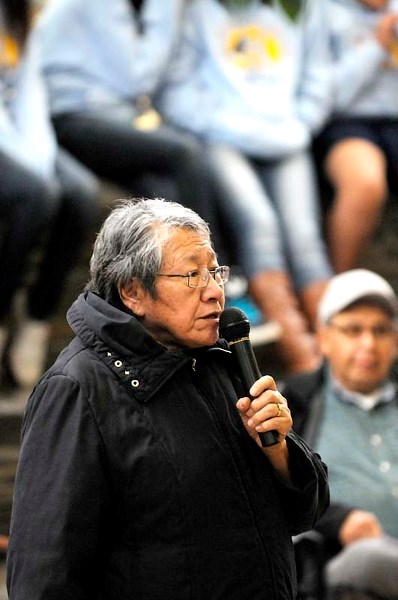Healing is at the heart of an upcoming round table discussion between Cochranites and prominent members of the Stoney Nakoda First Nation.
“My hope is to have people understand what we went through, but how resilient we are,” said participant Tina Fox, a residential school survivor and counsellor at Nakoda Elementary School.
“Bad things can break or make a person, and I choose to rise above things that have happened to me, to my family, and keep going forward. I realized we cannot stay in the past if we remain bitter and hateful … we remain victims of what we’ve gone through.
“I chose not to be a victim.”
Fox – a 76-year-old Stoney elder – is one of five people who will come together in Cochrane this Friday night to discuss the outcomes and 94 calls to action put forth by the federal Truth and Reconciliation Report, released in 2015 as an analysis of the harm inflicted upon First Nations people by their residential school experiences.
The group will also discuss the relationship between Cochrane and Stoney Nakoda First Nation residents.
RCMP Aboriginal Advisory Committee adviser Cathy Arcega, writer and University of Calgary doctoral student Trent Fox, Nakoda Income Support program co-ordinator Preston Twoyoungmen and learning facilitator Thomas Snow will round out the panel – which was organized by Cochrane Ideas and kicks off the 18-year-old organization’s fall program.
“We have five very … good people and very thoughtful people. I’m hoping we can get some robust conversation going,” said organizer Andy Marshall. “We don’t take a particular position on an issue – for moral discussion, there are no right answers. We all gain better understanding … I think that’s an important goal.”
Fox has lived in the Morley area most of her life, and said “there is still a lot of sickness in the community,” despite a wellness movement in the 1990s that helped reserve residents work through the “horrible” memories of their residential school experiences.
She hopes the panel discussion can bring attention to the ongoing issue, and she plans to advocate for another similar healing movement to help the Nation’s youth gain context into their older relatives’ pain.
“We have a lot of social problems on our reserve,” she said. “There needs to be another healing process of residential schools, especially of elders my age and older, so that we can move forward and our young people can learn and understand why grandma is this way, why dad is that way…”
Marshall said he’s excited to bring together a group of people who can affect that type of change – since moving these types of important discussions out of the veil of social media and into the real world is important to making real progress.
“There is an immediacy and ... a more emotional understanding that can be reached when you’re face to face with people, whereas social media – it has many wonderful advantages – but the drawbacks include possible misinterpretation of what somebody said,” he said. “(In person) there’s more opportunity to clarify, revise, go back and in fact move opinion on an issue.”
The Cochrane Ideas kick-off event takes place at Frank Wills Memorial Hall and is free of charge, though donations to the group are accepted. Participants will have an opportunity to ask questions and give comments, as well as listen to the panelists speak.
The discussion begins at 7 p.m.



